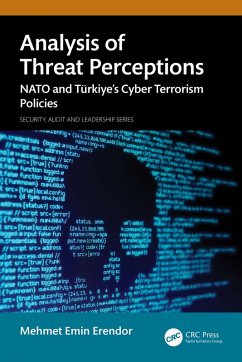
A Comprehensive Framework for Adapting National Intelligence for Domestic Law Enforcement (eBook, ePUB)

PAYBACK Punkte
0 °P sammeln!
"A Comprehensive Framework for Adapting National Intelligence for Domestic Law Enforcement" is a groundbreaking book that delves into the intricate process of integrating sophisticated national intelligence methodologies into domestic law enforcement practices. Authored by a seasoned expert in the field of intelligence, this book emerges as a critical resource for military leaders, policymakers, members of the intelligence community, and law enforcement personnel.This insightful work begins by exploring the historical evolution of intelligence sharing, offering a thorough analysis of past and ...
"A Comprehensive Framework for Adapting National Intelligence for Domestic Law Enforcement" is a groundbreaking book that delves into the intricate process of integrating sophisticated national intelligence methodologies into domestic law enforcement practices. Authored by a seasoned expert in the field of intelligence, this book emerges as a critical resource for military leaders, policymakers, members of the intelligence community, and law enforcement personnel.
This insightful work begins by exploring the historical evolution of intelligence sharing, offering a thorough analysis of past and present strategies. It then seamlessly transitions into discussing the current challenges and opportunities faced in integrating national intelligence into domestic law enforcement. The book provides an in-depth examination of legal and ethical frameworks, ensuring that the proposed methods adhere to the highest standards of civil liberties and legal compliance.
Central to the book is the development of a comprehensive framework that bridges the gap between national intelligence operations and local law enforcement requirements. This framework not only addresses operational aspects but also focuses on the technological advancements, such as AI and big data analytics, reshaping intelligence gathering and analysis.
The author brings to light the importance of cross-sector collaboration, suggesting innovative ways to enhance cooperation between various sectors - government, private, and non-profit - in intelligence activities. Case studies of successful intelligence collaboration, both domestic and international, are meticulously analyzed, offering practical insights and lessons learned.
Moreover, the book addresses the training and skill development necessary for effectively adapting national intelligence practices in a domestic context. It emphasizes the need for continuous professional development and the cultivation of a learning culture within law enforcement agencies.
"A Comprehensive Framework for Adapting National Intelligence for Domestic Law Enforcement" concludes with strategic recommendations for policy and practice, advocating for a progressive approach towards intelligence integration. This book is an invaluable asset for anyone involved in or interested in the intersection of national security, intelligence, and domestic law enforcement, providing a comprehensive guide to navigating this complex and evolving landscape.
This insightful work begins by exploring the historical evolution of intelligence sharing, offering a thorough analysis of past and present strategies. It then seamlessly transitions into discussing the current challenges and opportunities faced in integrating national intelligence into domestic law enforcement. The book provides an in-depth examination of legal and ethical frameworks, ensuring that the proposed methods adhere to the highest standards of civil liberties and legal compliance.
Central to the book is the development of a comprehensive framework that bridges the gap between national intelligence operations and local law enforcement requirements. This framework not only addresses operational aspects but also focuses on the technological advancements, such as AI and big data analytics, reshaping intelligence gathering and analysis.
The author brings to light the importance of cross-sector collaboration, suggesting innovative ways to enhance cooperation between various sectors - government, private, and non-profit - in intelligence activities. Case studies of successful intelligence collaboration, both domestic and international, are meticulously analyzed, offering practical insights and lessons learned.
Moreover, the book addresses the training and skill development necessary for effectively adapting national intelligence practices in a domestic context. It emphasizes the need for continuous professional development and the cultivation of a learning culture within law enforcement agencies.
"A Comprehensive Framework for Adapting National Intelligence for Domestic Law Enforcement" concludes with strategic recommendations for policy and practice, advocating for a progressive approach towards intelligence integration. This book is an invaluable asset for anyone involved in or interested in the intersection of national security, intelligence, and domestic law enforcement, providing a comprehensive guide to navigating this complex and evolving landscape.
Dieser Download kann aus rechtlichen Gründen nur mit Rechnungsadresse in A, B, CY, CZ, D, DK, EW, E, FIN, F, GR, H, IRL, I, LT, L, LR, M, NL, PL, P, R, S, SLO, SK ausgeliefert werden.













